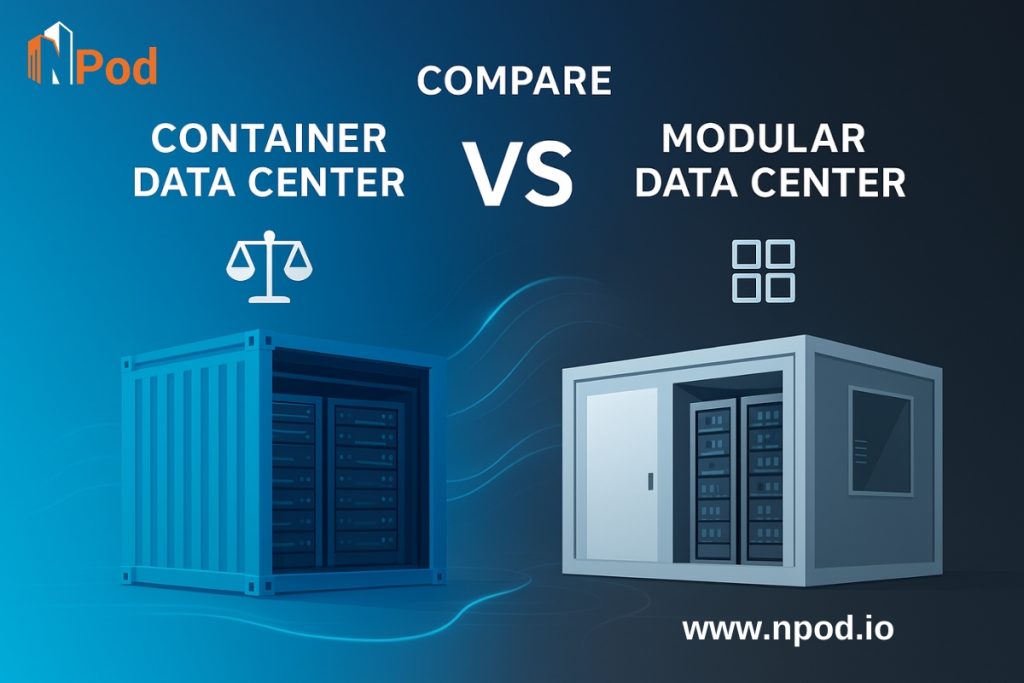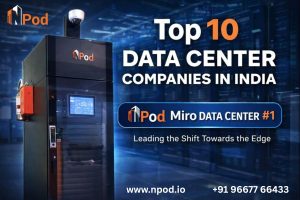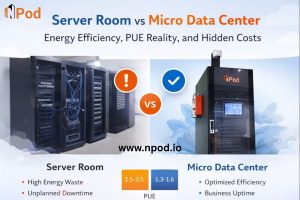Introduction
In the evolving world of digital infrastructure, enterprises and service providers are increasingly looking for efficient, cost-effective, and scalable alternatives to traditional brick-and-mortar data centers. Two of the most prominent approaches that have emerged are the Container Data Center and the Modular Data Center. While both models share the promise of rapid deployment, flexibility, and scalability, they differ in design, use cases, pricing, and long-term adaptability.
This blog provides a detailed comparison of Container Data Centers vs Modular Data Centers, helping IT leaders, CIOs, and businesses make informed decisions about which solution fits their operational and strategic needs.
What is a Container Data Center?
A Container Data Center is essentially a portable, prefabricated data center housed in a standard shipping container. It is designed for mobility, quick deployment, and ease of transport. These solutions come pre-integrated with servers, cooling systems, UPS, fire suppression, and monitoring tools, ready for plug-and-play installation.
Key characteristics of a Container Data Center:
- Built inside ISO standard containers (20ft, 40ft).
- Fully portable—can be transported to remote or urban sites.
- Designed for temporary, emergency, or edge deployments.
- Lower initial investment compared to large facility builds.
What is a Modular Data Center?
A Modular Data Center refers to a facility built using prefabricated modules that can be expanded as business requirements grow. It is not limited to shipping container dimensions. Instead, modular units are constructed in a factory environment and assembled on-site, allowing for custom sizes, layouts, and higher capacity.
Key characteristics of a Modular Data Center:
- Prefabricated sections assembled on-site.
- Scalable—can grow with demand.
- Greater flexibility in design, capacity, and layout.
- Suitable for long-term enterprise and hyperscale deployments.
Container Data Center vs Modular Data Center: A Detailed Comparison
- Design and Structure
- Container Data Center: Built inside shipping containers, compact and mobile.
- Modular Data Center: Composed of prefabricated modules, allowing more customization and larger scale.
Verdict: win for portability, while Modular Data Centers excel in scalability.
- Deployment Speed
- Container Data Center: Fully integrated before shipping, often deployed within weeks.
- Modular Data Center: Prefabricated but requires on-site assembly, usually takes a few months.
Verdict: Both are faster than traditional builds.
- Scalability
- Container Data Center: Limited by container size; expansion requires adding more containers.
- Modular Data Center: Designed for scalable growth; businesses can add modules as capacity needs increase.
Verdict: Modular Data Centers provide better long-term scalability.
- Mobility
- Container Data Center: Portable and relocatable, ideal for edge sites, temporary needs, or disaster recovery.
- Modular Data Center: Semi-permanent structures, not easily movable once deployed.
Verdict: Container Data Centers lead in mobility.
- Cost Considerations
- Container Data Center Price: Generally lower upfront cost, predictable budgeting, but may become expensive for large-scale growth.
- Modular Data Center Cost: Higher initial investment but cost-efficient over time as capacity can scale smoothly.
Verdict: Container Data Centers suit small/medium workloads; Modular Data Centers offer better ROI for long-term enterprises.
- Energy Efficiency & Cooling
- Container Data Center: Limited space restricts cooling options, though precision cooling units are often pre-installed.
- Modular Data Center: Greater design flexibility enables advanced cooling technologies, supporting higher density workloads.
Read About : 10PB Cloud
Which One Should You Choose?
The decision between a Container Data Center and a Modular Data Center depends on your business objectives, budget, and deployment strategy.
- Choose a Container Data Center if you need:
- Quick deployment in remote or temporary locations.
- Disaster recovery or military/field operations.
- Lower upfront investment.
- Choose a Modular Data Center if you need:
- Scalable and customizable infrastructure.
- Long-term data center capacity expansion.
- Higher energy efficiency for enterprise workloads.
A diplomatic approach acknowledges that both models complement different business needs. In fact, many organizations combine them—using container solutions for edge and temporary workloads, while relying on modular facilities for core enterprise operations.
FAQs
- What is the main difference between a Container Data Center and a Modular Data Center?
It is a portable solution built into shipping containers, ideal for mobility and fast deployment. A Modular Data Center is built from prefabricated modules that allow greater scalability and customization. - Which is cheaper: Container Data Center or Modular Data Center?
It has a lower initial price, but a Modular Data Center offers better long-term cost efficiency due to scalability and advanced energy management. - Are Container Data Centers secure?
Yes, modern Data Centers come with fire suppression, access control, surveillance, and monitoring systems, making them secure for enterprise workloads. - Can Modular Data Centers be relocated?
While technically possible, Modular Data Centers are semi-permanent and not designed for frequent relocation. They are better suited for mobility. - Which is better for edge computing?
Container Data Centers are better for edge deployments due to their portability, compact design, and quick installation.
Conclusion
Both Container Data Centers and Modular Data Centers represent the future of agile, scalable, and cost-efficient IT infrastructure. It is a portable, ready-to-deploy solution perfect for edge, remote, or temporary needs. On the other hand, a Modular Data Center is a scalable, customizable, and long-term solution tailored for enterprises and hyperscale providers.
The right choice depends on your business size, budget, and long-term IT strategy. By understanding their strengths and limitations, organizations can deploy the right data center model—or even a hybrid approach—to build resilient, future-ready infrastructure.




